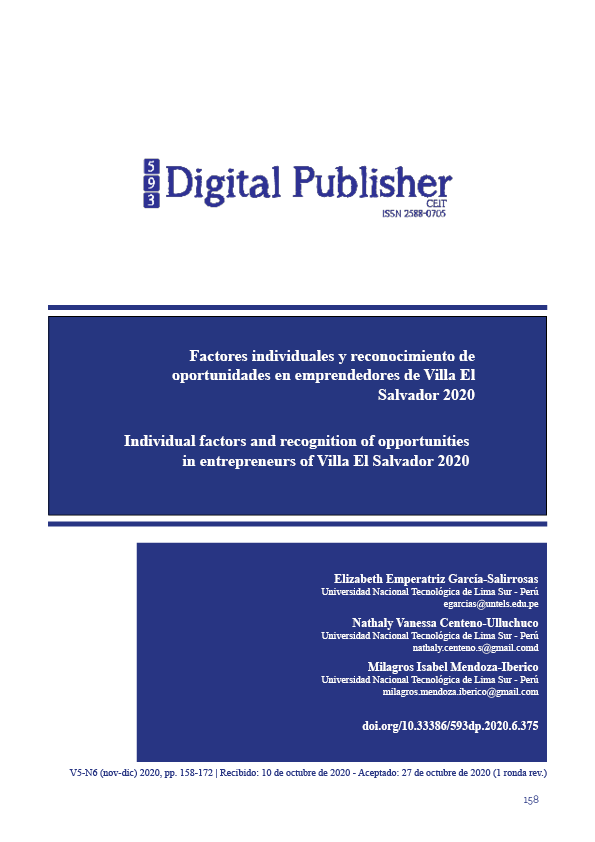Factores individuales y reconocimiento de oportunidades en emprendedores de Villa El Salvador 2020
Contenido principal del artículo
Resumen
La investigación tuvo como objetivo determinar la relación entre los factores individuales y el reconocimiento de oportunidades de los emprendedores del distrito de Villa el Salvador. Se aplicó un enfoque cuantitativo, correlacional, diseño no experimental de corte transversal. La muestra no probabilística y por conveniencia estuvo constituida por 178 emprendedores. El instrumento utilizado fue diseñado por Nikraftar & Hosseini, (2016) quienes lo aplicaron a emprendedores en Iran. Los resultados presentan un Rho de Spearman de 0.696 y un p valor 0.000, lo que indica una correlación moderada positiva y altamente significativa entre las variables, confirmándose de esta manera todas las hipótesis propuestas. Así mismo, se encontró que los factores individuales de los emprendedores del distrito de Villa el Salvador se encuentra en un nivel en desarrollo, quienes necesitan fortalecer su autoeficacia, su conocimiento previo, su red social y la alerta emprendedora para mejorar la capacidad de reconocimiento de oportunidades.
Descargas
Detalles del artículo

Esta obra está bajo una licencia internacional Creative Commons Atribución-NoComercial-CompartirIgual 4.0.
1. Derechos de autor
Las obras que se publican en 593 Digital Publisher CEIT están sujetas a los siguientes términos:
1.1. 593 Digital Publisher CEIT, conserva los derechos patrimoniales (copyright) de las obras publicadas, favorece y permite la reutilización de las mismas bajo la licencia Licencia Creative Commons 4.0 de Reconocimiento-NoComercial-CompartirIgual 4.0, por lo cual se pueden copiar, usar, difundir, transmitir y exponer públicamente, siempre que:
1.1.a. Se cite la autoría y fuente original de su publicación (revista, editorial, URL).
1.1.b. No se usen para fines comerciales u onerosos.
1.1.c. Se mencione la existencia y especificaciones de esta licencia de uso.
Citas
Adler, P., & Kwon, S.-W. (2002). Social Capital: Prospects for a New Concept. The Academy of Management Review, 27(1), 40. https://doi.org/10.2307/4134367
Ardichvili, A., Cardozo, R., & Ray, S. (2003). A theory of entrepreneurial opportunity identification and development. Journal of Business Venturing, 18(1), 105–123. https://doi.org/10.1016/S0883-9026(01)00068-4
Audretsch, D. (2018). Entrepreneurship, economic growth, and geography. Oxford Review of Economic Policy, 34(4), 637–651. https://doi.org/10.1093/oxrep/gry011
Burt, R. S. (2000). The Network Structure Of Social Capital. Research in Organizational Behavior, 22(1), 345–423. https://doi.org/10.1016/S0191-3085(00)22009-1
Carrillo, E., & Riera, J. (2017). La medición del capital social: nuevas perspectivas. Gaceta Sanitaria, 31(1), 57–61. https://doi.org/10.1016/j.gaceta.2016.09.002
Coleman, J. (1998). Social capital in the creation of human capital. Knowledge and Social Capital, 94, S95–S120. https://doi.org/10.1086/228943
DeTienne, D., & Chandler, G. (2004). Opportunity Identification and Its Role in the Entrepreneurial Classroom: A Pedagogical Approach and Empirical Test. Academy of Management Learning & Education, 3(3), 242–257. https://doi.org/10.5465/amle.2004.14242103
Elizundia, M. (2015). Desempeño de nuevos negocios: Perspectiva de género. Contaduria y Administracion, 60(2), 468–485. https://doi.org/10.1016/S0186-1042(15)30010-3
Freire, M. J., & Teijeiro, M. (2009). Análisis de los factores que afectan a la decisión de ser emprendedor. Cuadernos de Economía, 32(90), 5–27. https://doi.org/10.1016/s0210-0266(09)70052-4
Galvez, E., Guauña, R., & Ravina, R. (2020). Actitud e intención emprendedora en estudiantes de administración de empresas y de contaduría pública. Revista Universidad y Empresa, 22(38), 79–105. https://doi.org/10.12804/revistas.urosario.edu.co/empresa/a.7230
Hallak, R., Assaker, G., & Lee, C. (2015). Tourism Entrepreneurship Performance: The Effects of Place Identity, Self-Efficacy, and Gender. Journal of Travel Research, 54(1), 36–51. https://doi.org/10.1177/0047287513513170
Hernández, C., Camarero, C., & Gutiérrez, J. (2019). The internal mechanisms of entrepreneur´s social capital: A multi-network analysis. BRQ Business Research Quarterly, 6(1), 18. https://doi.org/10.1016/j.brq.2018.12.001
Hernández, R., Fernández, C., & Baptista, M. del P. (2014). Metodología de la Investigación. In McGRAW-HILL (6th ed.). https://www.uca.ac.cr/wp-content/uploads/2017/10/Investigacion.pdf
Inkpen, A., & Tsang, E. (2005). Social capital networks, and knowledge transfer. Academy of Management Review, 30(1), 146–165. https://doi.org/10.5465/AMR.2005.15281445
Karimi, S., Biemans, H., Lans, T., Chizari, M., & Mulder, M. (2016). The Impact of Entrepreneurship Education: A Study of Iranian Students’ Entrepreneurial Intentions and Opportunity Identification. Journal of Small Business Management, 54(1), 187–209. https://doi.org/10.1111/jsbm.12137
Kim, J. Y., Choi, D. S., Sung, C. S., & Park, J. Y. (2018). The role of problem solving ability on innovative behavior and opportunity recognition in university students. Journal of Open Innovation: Technology, Market, and Complexity, 4(1). https://doi.org/10.1186/s40852-018-0085-4
Kirzner, I. (1973). Competition and entrepreneurship. In University of Chicago Press. University of Chicago Press.
León, J. (2019). Emprendimiento empresarial y crecimiento económico en Perú. Estudios Gerenciales, 35(153), 429–439. https://doi.org/10.18046/j.estger.2019.153.3331
Mahfud, T., Triyono, M., Sudira, P., & Mulyani, Y. (2020). The influence of social capital and entrepreneurial attitude orientation on entrepreneurial intentions: the mediating role of psychological capital. European Research on Management and Business Economics, 26(1), 33–39. https://doi.org/10.1016/j.iedeen.2019.12.005
Manosalvas, O. (2017). Relación de la inteligencia emocional con la inteción de emprendimiento y la autoeficacia emprendedora.
Nahapiet, J., & Ghoshal, S. (1988). Social capital intellectual capital, and the organizational advantage. The Academy of Management Review, 23(2), 246–266. https://doi.org/10.2307/259373
Nikraftar, T., & Hosseini, E. (2016). Factors affecting entrepreneurial opportunities recognition in tourism small and medium sized enterprises. Tourism Review, 71(1), 6–17. https://doi.org/10.1108/TR-09-2015-0042
Ortega, J., Blanco, J., & Cangahuala, G. (2016). Social capital and adaptive planning in an innovative industrial community in Peru. Estudios Gerenciales, 32(139), 162–169. https://doi.org/10.1016/j.estger.2016.05.001
Pech, R. J., & Cameron, A. (2006). An entrepreneurial decision process model describing opportunity recognition. European Journal of Innovation Management, 9(1), 61–78. https://doi.org/10.1108/14601060610640023
Prandelli, E., Pasquini, M., & Verona, G. (2016). In user’s shoes: An experimental design on the role of perspective taking in discovering entrepreneurial opportunities. Journal of Business Venturing, 31(3), 287–301. https://doi.org/10.1016/j.jbusvent.2016.02.001
Putnam, R. (2000). Thinking about Social Change in America. In Bowling Alone: The Collapse and Revival of American Community (pp. 15–28). https://doi.org/10.2307/3089235
Ruiz, M., Sanz, I., & Fuentes, M. del M. (2015). Alerta emprendedora y conocimiento previo para la identificación de oportunidades emprendedoras: El papel moderador de las redes sociales. Investigaciones Europeas de Direccion y Economia de La Empresa, 21(1), 47–54. https://doi.org/10.1016/j.iedee.2014.07.002
Sarasvathy, S., Dew, N., Velamuri, S. R., & Venkataraman, S. (2010). Three Views of Entrepreneurial Opportunity. In Handbook of Entrepreneurship Research (Vol. 5, Issue 1909, pp. 77–96). https://doi.org/10.1007/978-1-4419-1191-9
Schumpeter, J. (1934). The theory of economic development. In Harvard Economic Studies.
Shane, S., Locke, E. A., & Collins, C. J. (2003). Entrepreneurial motivation. Human Resource Management Review, 13(2), 257–279. https://doi.org/10.1016/S1053-4822(03)00017-2
Shane, S., & Venkataraman, S. (2000). The promise of entrepreneurship as a field of research. Academy of Management Review, 25(1), 217–226. https://doi.org/10.5465/AMR.2000.2791611
Simón, V., Sastre, O., & Revuelto, L. (2015). El emprendedor social: análisis de la alerta social. Suma de Negocios, 6(14), 155–165. https://doi.org/10.1016/j.sumneg.2015.07.001
Song, G., Min, S., Lee, S., & Seo, Y. (2017). The effects of network reliance on opportunity recognition: A moderated mediation model of knowledge acquisition and entrepreneurial orientation. Technological Forecasting and Social Change, 117(1), 98–107. https://doi.org/10.1016/j.techfore.2017.01.004
Texis, M., Ramírez, M., & Aguilar, J. (2016). Microempresas de base social y sus posibilidades de supervivencia. Contaduria y Administracion, 61(3), 551–567. https://doi.org/10.1016/j.cya.2015.04.001
Vélez, C. I., Bustamante, M. A., Loor, B. A., & Afcha, S. M. (2020). La educación para el emprendimiento como predictor de una intención emprendedora de estudiantes universitarios. Formación Universitaria, 13(2), 63–72. https://doi.org/10.4067/s0718-50062020000200063
Vodă, A., & Florea, N. (2019). Impact of personality traits and entrepreneurship education on entrepreneurial intentions of business and engineering students. Sustainability (Switzerland), 11(4), 1192. https://doi.org/10.3390/SU11041192
Wang, Y. L., Ellinger, A. D., & Wu, Y. C. J. (2013). Entrepreneurial opportunity recognition: An empirical study of R&D personnel. Management Decision, 51(2), 248–266. https://doi.org/10.1108/00251741311301803




